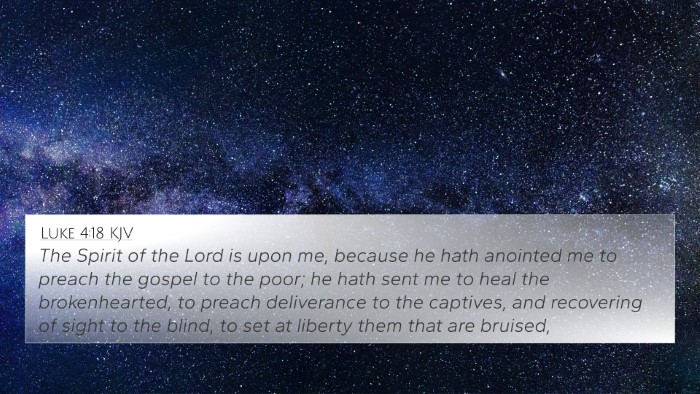Psalms 147:3:
"He healeth the broken in heart, and bindeth up their wounds."
Understanding Psalms 147:3
Psalms 147:3 offers a profound affirmation of God's care and compassion towards those who are suffering. The verse emphasizes two crucial aspects of divine intervention: healing and restoration of both the heart and the wounds of life.
Key Insights from Commentaries
-
Matthew Henry:
Matthew Henry's commentary underscores God’s role as a healer of the brokenhearted, indicating that emotional pain is significant and that God actively works to mend it. He highlights that this healing is not merely physical but extends to our emotional and spiritual wounds as well.
-
Albert Barnes:
Barnes interprets this verse in the context of God’s comforting presence during times of trouble. He notes that the term "broken in heart" signifies deep despair, suggesting that God is intimately aware of our pain and is ever present to provide solace.
-
Adam Clarke:
Clarke’s exposition focuses on the metaphor of binding up wounds, indicating that God’s healing is tender and meticulous. He illustrates that God’s compassion extends to personal sufferings, emphasizing His active role in the lives of those in distress.
Cross-References to Psalms 147:3
This verse resonates with several other biblical passages that reinforce its themes of healing and comfort:
- Psalm 34:18: "The LORD is near to the brokenhearted and saves the crushed in spirit." - This verse parallels the compassionate nature of God towards those in emotional distress.
- Isaiah 61:1: "He has sent me to bind up the brokenhearted, to proclaim liberty to the captives..." - This passage echoes the restorative promise of healing for those suffering.
- 2 Corinthians 1:3-4: "Blessed be the God and Father of our Lord Jesus Christ... who comforts us in all our affliction." - Here, the New Testament reinforces God’s unchanging nature in providing comfort and healing.
- Matthew 11:28-30: "Come to me, all who labor and are heavy laden, and I will give you rest." - Jesus invites those burdened by life's struggles to find rest and healing in Him.
- Revelation 21:4: "He will wipe away every tear from their eyes, and death shall be no more..." - This versifies the ultimate healing and restoration God promises to His people.
- Jeremiah 30:17: "For I will restore health to you, and your wounds I will heal, declares the LORD..." - The commitment of God to heal His people is revisited in this Old Testament promise.
- Lamentations 3:32-33: "Though he cause grief, he will have compassion according to the abundance of his steadfast love..." - Reflects the dual experiences of suffering and divine compassion.
Thematic Bible Verse Connections
The exploration of Psalms 147:3 opens a dialogue with numerous themes in scripture, such as healing, comfort, and divine support in times of suffering. By understanding this verse, one gains insight into God’s nature as a healer.
-
Healing Verses:
Both physical and emotional healing are evident throughout the Bible, illustrated vividly in verses like James 5:14-15 which speaks of prayer and healing.
-
Comfort in Affliction:
The theme of finding comfort during affliction is prevalent in passages like Psalm 23, which portrays God as a shepherd leading to peace.
-
Divine Compassion:
Exploration of God's compassion can be cross-referenced in stories like the Good Samaritan (Luke 10:25-37) which emphasizes care for the hurting.
Tools for Bible Cross-Referencing
To delve deeper into the connections between Bible verses, the following tools can be valuable resources:
- Bible Concordance: A Bible concordance lists words found in the Bible, allowing for easier finding of related verses.
- Bible Cross-Reference Guide: This includes guides specifically designed to map out connections between different biblical texts.
- Cross-Reference Bible Study: Engaging in cross-referencing can lead to a richer understanding of overarching themes in scripture.
- Comprehensive Bible Cross-Reference Materials: These materials compile extensive cross-references across both Old and New Testaments for deeper study.
Identifying Connections Between Scriptures
When studying scripture, it becomes essential to identify the connections between various Bible verses:
-
How to find cross-references in the Bible:
Utilizing concordances or tools like Bible software can facilitate the finding of pertinent cross-references.
-
Detailed cross-reference between Gospels:
Comparative studies of the Gospels reveal deeper insights into Jesus’ message and healing ministry.
-
Links between the Prophets and Apostolic Teachings:
Many New Testament teachings echo or fulfill the promises found in Old Testament prophecies.
Interpreting Biblical Themes through Cross-References
By examining these connections, one can interpret broader biblical themes and messages:
- Bible verses related to comfort: Connecting verses that speak of comfort can add depth to our understanding of God’s nurturing side.
- Cross-referenced themes in the Bible: Studying multiple verses on a single theme (like healing) illuminates God’s consistent nature.
- Cross-referencing Psalms with New Testament teachings: The fulfillment of Old Testament psalms in New Testament writings highlights a cohesive narrative of God’s plan.
Conclusion: The Importance of Cross-Referencing Scripture
Understanding Psalms 147:3 is enriched through the practice of cross-referencing. By looking at related verses, one can grasp a fuller picture of God’s character as a healer and comforter of those who are afflicted. Engaging with cross-references invites a deeper faith experience and appreciation for the interconnectedness of the biblical narrative.













